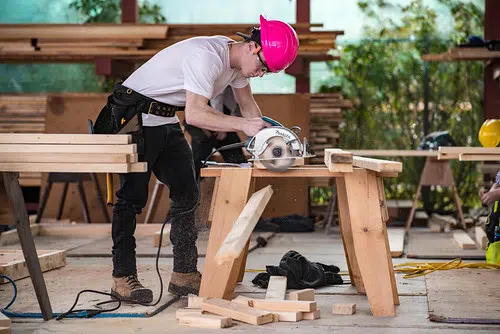If you decide to go into a trades school of any type, chances are you will end up with a pretty good high paying gig. From plumbing to electrical, the majority of trades offer high salary, good pension jobs.
The Fanshawe London campus offers a number of these courses, including carpentry and sheet metal. Jim Leslie is the program coordinator for the carpentry apprenticeship program, and oversees the other trades at the college.
“Our most popular trade is probably electric, that’s where we see the largest intake and the most numbers, followed by plumbing, carpentry, and sheet metal” says Leslie.
So why are so many students deciding to take electrical, rather than any other trade?
“It’s a trade that’s versatile, you can do a lot of different work from residential, commercial, industrial, there are a lot of different routes you can take with this trade” says Leslie.
“Not that you can’t do that in other trades, but I think electrical is just one of those trades that appeals to the younger audience.”
So are trades becoming less popular over the years?
“I’d say we’ve been pretty steady, we’re definitely starting to see increases because the ratio has changed to a 1:1” says Leslie.
“I know electrical is increasing, plumbings increasing, we’re starting to slowly increase, we’ve been seeing more people sign up for carpentry.”
Leslie says the government has done a lot over the past few years to try and get students to pursue trades as a career.
“There was a period where it was kinda slow for a bit, but I think the government is definitely over the last year or two is starting to wake up and realize that trades needs to be redefined, re-promoted, and get it out there so that young kids know that this is a good career path, and financially, not a bad path either.”
Leslie says that it’s the stigma on trades, that usually sets people off.
“The problem with trades is the stigma is that it’s a dirty, old, work in the mud type of job, and it’s a job for someone that can’t go to University, that’s the old saying.”
Leslie says that is far from the truth.
“There are more University grads that are tradesman than you’d ever know before, so it’s not a matter of how smart you are, it’s a matter of what you enjoy doing, your enthusiasm, your ambition, and work ethic.”
Leslie says that even if you end up wanting to be something else, you always have your tradesman license just in case.
“You can get your license in four years, you can go do something else, but you always got your license, you’re always a tradesman.”
“Some people don’t like it after they get their ticket, they go in and do a different career, but they always got their license, and they can always be a tradesman.”
A lot of young people don’t feel the need to learn trades anymore. Leslie explains why it’s still so important for the younger generation.
“It’s been such a rewarding career. I’ve got to do so much, traveled around the country, I worked on some very big projects that I never would have thought I’d be doing. It’s also very satisfying, nothing is as more satisfying as you walking into a building that you helped built, and people are in there enjoying that building in a commercial end, or even residential.”
Leslie stresses the importance on trades as a whole, and not just for students.
“It’s important for our society, we’re at an age where we’re getting a lot of older tradesman, they’re retiring, and we don’t have people filling their shoes, and if you don’t have qualified people to follow up, then we’re going to have to start having problems with shortage of buildings, delays, cost going up because we don’t have the man power and skill.”
Leslie goes back to the stigma of trades, and says we need to change it in order to have more tradesman.
“I go back to the stigma, the marketing has to be changed, and it starts right down to elementary and high schools, and the government has to start pushing it there, councilors have to realize that this is a viable profession, it’s not just some dirty old job that because you can’t get to University, you should go and be a brick layer, that’t not the case.”
It sounds like being a tradesman even in today’s world, isn’t so much of a bad choice after all.













